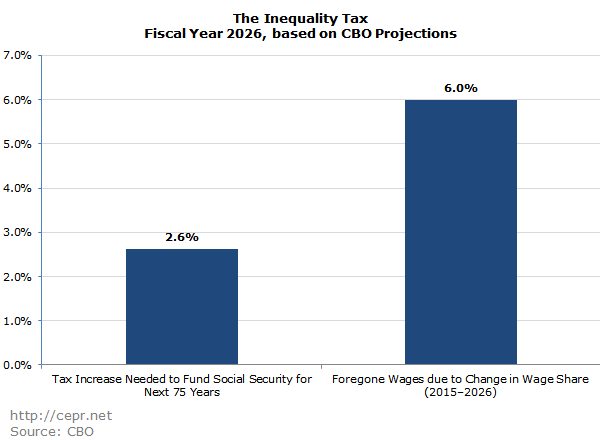March 01, 2016
A little over a week ago, CEPR released a blog post looking at the Congressional Budget Office’s (CBO) projections for wage growth over the next decade. Based on the data presented in their 2016 Budget and Economic Outlook, CBO expects wage inequality to rise substantially over the next decade.
It is striking that this projection of a continuing rise in inequality has gotten so little attention. By contrast, the media constantly talk about the projected shortfalls in the Social Security Trust Fund, making the point that if the projections prove correct then in 2034 we will either have to cut benefits or raise taxes.
The prospect of a tax increase is treated as a horrible disaster, even though workers faced tax increases comparable in size to what we would be looking at in the decades of the 1950s, 1960s, 1970s, and 1980s. And of course to maintain full benefits, we don’t have to do it simply by raising the payroll tax. We could, for example, raise the cap on taxable wages which is now set at $118,500. Growing inequality has been one of major factors behind the projected shortfall as an ever growing share of wage income falls over the cap and goes untaxed.
But suppose we did maintain full benefits entirely by raising the payroll tax. According to the most recent Social Security Trustees Report, that would require a tax increase of 1.3 percentage points on both the worker and the employer. Economists conventionally assume that the employer’s side of the tax comes out of wages, so this means that the tax increase would be a 2.6 percent reduction in workers’ pay. How does this compare to the impact for the typical worker of the growth in wage inequality that we have seen in the recent past and CBO projects to continue for the next decade?
The figure below shows how important both these factors will be for most Americans’ pocketbooks in 2026. It compares the 2.6 percent tax increase necessary to fund Social Security for the next 75 years with the foregone earnings of most workers due to rising wage inequality.

While a rise in the Social Security tax would be bad for many Americans’ pocketbooks, the threat they face from rising inequality is considerably worse. Unfortunately it seems to get much less attention in policy circles.






